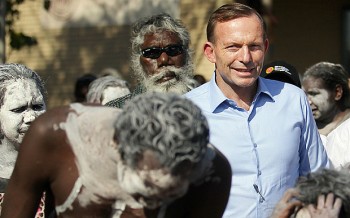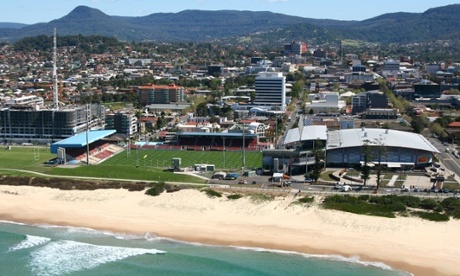Abbott’s (and Shorten’s) lies lead Australia to a sinister place
powers, and its involvement in Iraq, on lies. And they will damage us
like the previous Iraq war damaged us.

It was the most worrying and wrong-headed speech by a
national leader since, well, the last time we went to war under false
pretences in Iraq. Tony Abbott’s national security statement
to Parliament yesterday — strongly backed by Opposition Leader Bill
Shorten — takes Australia into a very dark place, and it does so based
on what can only be described as lies — unless you accept that the
government of Australia is profoundly ignorant.
It can only be a lie, or a reflection of an implausibly vast
ignorance, to seriously maintain, as Abbott did yesterday, that Islamic
State (also called ISIS or ISIL) represents any sort of “unprecedented”
threat to Australia. IS is no more an unprecedented threat than it is
an “exisential threat”, as the Attorney-General absurdly labelled it
last week. This is a group of terrorists who are, as the FBI and the
Department of Homeland Security in the United States have noted, unable
to mount any terrorist operations against the US. This is a group that,
in its febrile statement of yesterday calling for anyone insane or evil
enough to heed its demands to attack Westerners, admitted the
difficulties in organising such attacks, suggesting that if all else
failed they should pick up a rock and hit someone with it, or spit in
strangers’ faces. This is the group whose idea of terror in Australia
isn’t 9/11 or even public transport bombings but the murder of a random
passer-by — although, bizarrely, at least one media outlet on the
weekend was trying to claim such attacks would be somehow more damaging
than a mass casualty attack.
Then again, that’s one of the iron-clad rules of the War on
Terror — each threat is always hyped as somehow worse than the last one.
And it can only be a lie to insist, as Abbott and Shorten
both do, that our participation in the attack on Iraq will not make the
risk of terrorism in Australia greater. It’s a lie that voters, as
today’s Essential Report shows, simply don’t buy. The government is
literally using the Bush line that Islamic State simply hates us for our
freedom. After Crikey reported yesterday
that the Australian Federal Police had been gagged from offering its
own assessment of whether the Iraq deployment made terrorism a greater
risk, the Attorney-General’s Department eventually sent us its “whole of
government” response.
“ISIL and their followers in
Australia do not hate us for what we do, they hate us for who we are and
how we live,” an AGD bureaucrat said. “They hate that fact that we are
free, pluralist, tolerant, and welcoming.” You can read the full response here.
AGD, the Prime Minister and Bill Shorten were, alas, humiliated within hours when Islamic State’s ludicrously over-the-top statement
calling for the killing of Westerners emerged, specifically targeting
“the disbelievers waging war, including the citizens of the countries
that entered into a coalition against the Islamic State” and referring
to Australia “sending its legions” against IS.
Faced with the inconvenience of IS attributing the need for
terrorism in the West to the attacks on itself, the Prime Minister’s
office was reported to have issued a bizarrely self-contradictory
statement that “Australian agencies regard the statement issued today by
ISIL calling for attacks against members of the international
coalition, including Australians, as genuine. ISIL will claim that our
involvement in this international effort is the reason they are
targeting us, but these people do not attack us for what we do, but for
who we are and how we live.”
That is, you should believe IS when it says things that fit
the government’s War on Terror narrative, but not when it says things
that don’t fit it.
The government has built its case for extensions of national
security powers and war in Iraq on these two lies — lies that, as we’ll
see, are self-reinforcing. This is the same War on Terror cycle that
has previously been played out when the 2003 attack on Iraq made
Westerners less safe from terrorism and that, in turn, was used to
justify further extensions of powers and continued military intervention
in Pakistan and Yemen over the course of the last decade. Now, the
government’s decision to attack IS has made Australia less safe, and
that reduction in safety is being used to justify both the decision to
attack IS and further curbs on our freedoms.
And Abbott’s most chilling words yesterday were his blunt demand that liberty be sacrificed for security:
“Regrettably, for some time to
come, the delicate balance between freedom and security may have to
shift. There may be more restrictions on some so that there can be more
protections for others.”
But contrary to what Abbott implies, the balance between
freedom and security in Australia has been relentlessly shifting for
over a decade, and it has always shifted away from freedom. This is a “delicate balance” that only ever
shifts in favour of more government power and less individual
freedom — the freedom that Abbott insists is why IS really wants to kill
us.
They hate us for our freedom, so we curb our freedoms. Well, there’s some logic there.
As for “more restrictions on some so that there can be more
protections for others”, there could be few more worrying threats by a
political leader, especially when it is clear that the “some” will be
drawn almost exclusively from one community. The Muslim men deemed to
have been using their phones in some sort of suspicious manner at a footy match; the baseless detention of a senior Muslim cleric by Customs;
the dozens of homes of Muslim Australians raided last week without any
charges resulting; the strangely convenient first use of the hitherto
“unworkable” preventive detention orders (which were created to deal
with the terror threat created by the Iraq invasion) on Muslim
citizens — all reflect that this is about the harassment of a single
minority.
And that harassment, to borrow Abbott’s phrasing, isn’t
because of anything Muslim Australians have done, but because of who
they are.
It is also becoming painfully clear that the strategy the
government has embarked on with the Americans in Iraq is likely to fail.
That’s the view of Tony Blair, who knows a thing or two about launching
attacks in Iraq based on lies: echoing the CIA’s view that the
enterprise is “doomed to failure”, he says airstrikes won’t be enough and Western ground forces will be needed. And confirming the FBI’s claim that support for IS has been strengthened by airstrikes, there is evidence airstrikes have prompted a massive surge in IS recruitment. Almost as if that was exactly what IS had in mind when it started trying to goad the West into attacking it.
And while the Abbott government is helping make IS stronger,
regional powers appear reticent.* Saudi Arabia won’t commit any
military forces to the fight against IS, the country’s richest man Prince Alwaleed Bin Talal Al Saud says.
“This does not really affect our country explicitly,” he said. IS
“doesn’t really affect” Saudia Arabia: the Prince sounds … what’s Tony
Abbott’s word? … almost “insouciant”.
We’ve been here before, obviously — the quagmire of Iraq,
Western intervention that strengthens terrorists, the curtailment of the
freedoms, the systematic harassment of Muslims. As John Howard popped
up on the weekend to remind us, some still insist the 2003 Iraq War
wasn’t based on lies, but simply poor intelligence. Well, there’s no
doubt this time around: lies are at the heart of this new Iraq venture,
and it will take us back to the same dark place as before.
* Update: it’s been reported that Bahrain,
Jordan, Qatar, Saudi Arabia and the United Arab Emirates played a role
in today’s US air strikes within Syria against IS, although what role
each played will be revealed later today Australian time.








